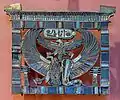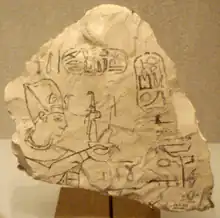| Adze-on-Block in hieroglyphs | ||
|---|---|---|

Cartouche on pillar.
The ancient Egyptian Adze on a Wood Block, or Axe in a Block of Wood[1] hieroglyph, Gardiner sign listed no. U20, is a portrayal of the adze. It is used mostly in the cartouches of pharaonic names especially, or other important names.
The adze on block[2] has the Egyptian language value of stp[3] and is the verb "choose". It is used as a determinative[4] in 'stp', "cut into pieces", and as an ideogram[5] for 'stp', "choose", "choice".
The adze tool sign, Gardiner nos. U18 and U19,
,
, portray just the adze, (or hand-axe).
Cartouche usage: "chosen of"
The most common usage of this hieroglyph is for a descriptor with the names in the pharaonic cartouche. An example for Ramesses II, shows his prenomen as:
UserMaatRe SetepeNRe, and is approximately: Maat's Power of Ra, (the) Chosen of Ra. (i.e. Maat's Powerful and Chosen (one) of Ra)
See also
- Gardiner's Sign List#U. Agriculture, Crafts, and Professions
- List of Egyptian hieroglyphs
- Adze#Africa
 Statue of Pharaoh Osorkon I
Statue of Pharaoh Osorkon I


References
Wikimedia Commons has media related to Adze on block (stp hieroglyph).
- Betrò, 1995. Hieroglyphics: The Writings of Ancient Egypt, Maria Carmela Betrò, c. 1995, 1996-(English), Abbeville Press Publishers, New York, London, Paris (hardcover, ISBN 0-7892-0232-8)
- Collier and Manley, 1998. How to Read Egyptian Hieroglyphs: A Step-by-Step Guide to Teach Yourself, Mark Collier (Egyptologist), and Bill Manley, c 1998, University of California Press, 179 pp, (with a word Glossary, p 151-61: Title Egyptian-English vocabulary; also an "Answer Key", 'Key to the exercises', p 162–73) (hardcover, ISBN 0-520-21597-4)
This article is issued from Wikipedia. The text is licensed under Creative Commons - Attribution - Sharealike. Additional terms may apply for the media files.